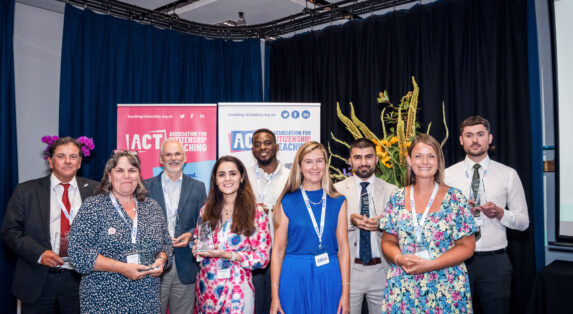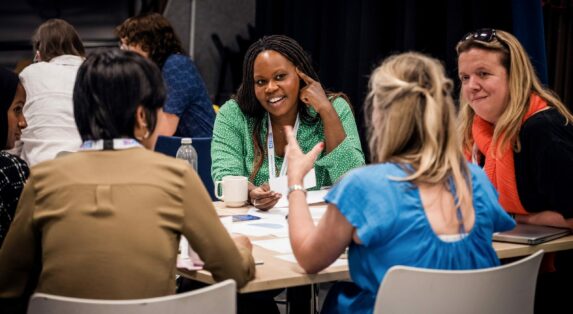
Citizenship Teaching Awards: Kelly Allchin, School of the Year Winner 2023
Kelly Allchin shares her profound commitment to Citizenship education in fostering societal engagement.
Fueled by a deep commitment to empowering young minds and fostering civic participation, Kelly Allchin reflects on the pivotal role of Citizenship education in a diverse and challenging environment.
Embarking on the path of Citizenship education has been an incredibly fulfilling journey for me, propelled by a deep-seated passion for empowering young minds and fostering active participation in civic life. Fast forward to the present, and I find myself at Leeds City Academy, where the diverse cultural landscape and unique challenges have further enriched my experiences. My commitment to Citizenship education stems from a profound belief in its ability to open doors for students, allowing them to navigate not only the complexities of the digital era but also the broader landscape of societal engagement.
Background: From Youth Worker to Citizenship Teacher
My journey into education began with a PGCE at Bristol, at a time when Citizenship was a relatively new subject. Working as a youth worker previously, I realised I was passionate about young people knowing their rights and using their voice, and I wanted to know how to do it full time. If Citizenship education didn’t exist, I would not be a teacher today. Since completing my PGCE, I’ve been at Leeds City Academy.
My background in youth work profoundly influenced my approach to education. Understanding that issues like anti-social behaviour can stem from a lack of knowledge on expressing oneself safely, I felt compelled to take action. Young people are inherently political; they have ideas and opinions. Citizenship education provides them with a platform to be heard, fostering participation in their community.
Young people are inherently political; they have ideas and opinions. Citizenship education provides them with a platform to be heard, fostering participation in their community.
Winning the Award: Triumph of Diversity
The Citizenship School of the Year award holds such a special significance for Leeds City Academy. Situated in an inner-city environment and in the bottom 5% nationally for socioeconomic deprivation, our school faces unique challenges. With 86 different languages spoken, many students are new to English or speak it as a second language. The award is a testament to the dedication of our staff to fostering understanding between diverse individuals and promoting an inclusive environment.
Activities such as student groups, parliamentary involvement, and educational trips played a pivotal role in earning this accolade. By instilling values that promote active listening, respect for processes, and human connection, we bridge the gaps in our diverse student population.
Illuminating Futures: Commitment to Whole-School Citizenship
Our commitment to Citizenship education is a whole-school approach. Witnessing students progress to law and politics degrees is a particularly rewarding outcome. I see it as our duty to open their eyes to citizenship and political participation at a young age, enabling them to become the future lawmakers and policymakers our society needs. Some have even ventured into political spheres through the Labour Party and Youth Parliament.
What brings me immense satisfaction, and I consider it a responsibility, is the opportunity to broaden their perspective on political engagement during their formative years. It’s about awakening in them their potential to evolve into the future architects of law and policymakers.
Navigating Challenges: The Value of Citizenship Education
While fortunate to have a school deeply invested in Citizenship education, I acknowledge the challenges others face in getting Citizenship the recognition it deserves at their school. True value is born when senior leadership appreciates its significance. Without this genuine appreciation, even the most dedicated Citizenship teacher may not realise their full potential, and students can sense this.
The impact of having Citizenship as a GCSE subject is pivotal. It ensures that the subject is integrated into the broader curriculum, contributing to its overall value and recognition within the educational landscape.
Crafting Critical Thinkers: the Power of Citizenship Curriculum
The Citizenship curriculum is a hidden gem for personal development assessments. Critical thinking, a cornerstone of Citizenship GCSE, permeates across subjects. Collaborating with other departments, especially English and History, opens avenues to explore complex topics and instills the skills vital for navigating the world.
Utilize the Citizenship curriculum for Ofsted Personal Development assessments. The critical thinking skills developed in Citizenship GCSE are crucial for all subjects. Engage in cross-curricular collaboration, particularly with English and History departments, exploring topics like law and justice. Embrace controversial topics, providing students with outlets to express themselves. Encourage critical debate, even on polarising subjects, and be honest about what you can and can’t know.
Looking ahead: Developing Global Citizens
Looking ahead, I envision Citizenship Education expanding to embrace global perspectives. By delving into international organizations and governance, we equip students to be global citizens. Elevating Citizenship education to the status it deserves ensures that the next generation becomes active participants in shaping their society.
ACT Citizenship Teaching Awards 2024: Nominations are open
The Citizenship Teaching Awards is an opportunity to acknowledge the fabulous work of individuals and organisations who have shown commitment to Citizenship education, and represent its core values. Do you know of someone who’s gone the extra mile to support students and provide effective Citizenship education?
Find out more about the awards and how to nominate below.


